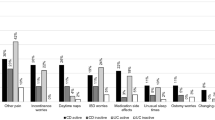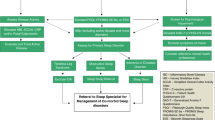Abstract
Background
Sleep disturbance is common in inflammatory bowel disease (IBD) and is associated with poorer quality of life and increased disease activity; however, sleep is a multidimensional process, and little is known about specific sleep characteristics and rest–activity rhythms (RARs) in this population.
Aims
The purposes were to (1) describe sleep characteristics and RARs; (2) compare sleep characteristics and RARs and GI symptoms by disease activity; and (3) describe associations between sleep characteristics, RARs, and GI symptoms among adults with IBD.
Methods
We conducted a cross-sectional study of adults with IBD. We measured sleep characteristics and RARs (continuous wrist actigraphy); GI symptoms (PROMIS-GI); and disease activity (physicians’ global assessment). We conducted cosinor and nonparametric analyses to compute RAR variables and bivariate analyses to address the aims.
Results
The sample included 37 participants [age M = 38 years (SD = 13.8) and 21 (56.8%) female], of whom 23 (60.6%) were in remission. Sleep efficiency [M = 82.91% (SD 5.35)] and wake after sleep onset (WASO) [M = 42.26 min (SD 18.57)] were not associated with disease activity. Inter-daily stability of the RAR was associated with heartburn/reflux (r = − .491, p = .005) and gas/bloating (r = − .469, p = .008). Intra-daily variability of the RAR was associated with heartburn/reflux (r = .421, p = .018).
Conclusions
People with IBD may have disrupted RARs, which are associated with GI symptoms. Research is needed to improve understanding of these associations and to develop interventions to improve these characteristics in adults with IBD.
Similar content being viewed by others
References
Shivashankar R, Tremaine WJ, Harmsen WS, Loftus EV. Incidence and prevalence of crohn’s disease and ulcerative colitis in Olmsted County, Minnesota from 1970 through 2010. Clin Gastroenterol Hepatol. 2017;15:857–863.
Conley S, Proctor DD, Jeon S, Sandler RS, Redeker NS. Symptoms clusters in adults with inflammatory bowel disease. Res Nurs Health. 2017;40:424–434.
Borbely AA, Daan S, Wirz-Justice A, Deboer T. The two-process model of sleep regulation: a reappraisal. J Sleep Res. 2016;25:131–143. https://doi.org/10.1111/jsr.12371.
Gingold-Belfer R, Peled N, Levy S, et al. Impaired sleep quality in Crohn’s disease depends on disease activity. Dig Dis Sci. 2013;. https://doi.org/10.1007/s10620-013-2890-8.
Ali T, Madhoun MF, Orr WC, Rubin DT. Assessment of the relationship between quality of sleep and disease activity in inflammatory bowel disease patients. Inflamm Bowel Dis. 2013;19:2440–2443. https://doi.org/10.1097/MIB.0b013e3182a0ea54.
Ranjbaran Z, Keefer L, Farhadi A, Stepanski E, Sedghi S, Keshavarzian A. Impact of sleep disturbances in inflammatory bowel disease. J Gastroenterol Hepatol. 2007;22:1748–1753.
Graff LA, Vincent N, Walker JR, et al. A population-based study of fatigue and sleep difficulties in inflammatory bowel disease. Inflamm Bowel Dis. 2011;17:1882–1889. https://doi.org/10.1002/ibd.21580.
Chang S, Malter L, Hudesman D. Disease monitoring in inflammatory bowel disease. World J Gastroenterol. 2015;21:11246–11259. https://doi.org/10.3748/wjg.v21.i40.11246.
Tang Y, Preuss F, Turek FW, Jakate S, Keshavarzian A. Sleep deprivation worsens inflammation and delays recovery in a mouse model of colitis. Sleep Med. 2009;10:597–603. https://doi.org/10.1016/j.sleep.2008.12.009.
Preuss F, Tang Y, Laposky AD, Arble D, Keshavarzian A, Turek FW. Adverse effects of chronic circadian desynchronization in animals in a “challenging” environment. Am J Physiol Regul Integr Comp Physiol. 2008;295:R2034–R2040. https://doi.org/10.1152/ajpregu.00118.2008.
Smith MT, McCrae CS, Cheung J, et al. Use of actigraphy for the evaluation of sleep disorders and circadian rhythm sleep-wake disorders: an american academy of sleep medicine systematic review, meta-analysis, and GRADE assessment. J Clin Sleep Med. 2018;14:1209–1230. https://doi.org/10.5664/jcsm.7228.
Ananthakrishnan AN, Long MD, Martin CF, Sandler RS, Kappelman MD. Sleep disturbance and risk of active disease in patients with Crohn’s disease and ulcerative colitis. Clin Gastroenterol Hepatol. 2013;. https://doi.org/10.1016/j.cgh.2013.01.021.
Neikrug AB, Rissling M, Trofimenko V, et al. Bright light therapy protects women from circadian rhythm desynchronization during chemotherapy for breast cancer. Behav Sleep Med. 2012;10:202–216. https://doi.org/10.1080/15402002.2011.634940.
Sobolewska-Wlodarczyk A, Wlodarczyk M, Szemraj J, Stec-Michalska K, Fichna J, Wisniewska-Jarosinska M. Circadian rhythm abnormalities—association with the course of inflammatory bowel disease. Pharmacol Rep. 2016;68:847–851. https://doi.org/10.1016/j.pharep.2016.04.007.
Huang Y, Liu R, Wang Q, Van Someren EJW, Xu H, Zhou J. Age-associated difference in circadian sleep–wake and rest–activity rhythms. Physiol Behav. 2002;76:597–603. https://doi.org/10.1016/s0031-9384(02)00733-3.
Turner D, Griffiths AM, Mack D, et al. Assessing disease activity in ulcerative colitis: Patients or their physicians? Inflamm Bowel Dis. 2010;16:651–656. https://doi.org/10.1002/ibd.21088.
Conley S, Knies A, Batten J, et al. Agreement between actigraphic and polysomnographic measures of sleep in adults with and without chronic conditions: a systematic review and meta-analysis. Sleep Med Rev. 2019;46:151–160.
Ancoli-Israel S, Cole R, Alessi C, Chambers M, Moorcroft W, Pollak C. The role of actigraphy in the study of sleep and circadian rhythms. American academy of sleep medicine review paper. Sleep. 2003;26:342–392.
Hirshkowitz M, Whiton K, Albert SM, et al. National sleep foundation’s sleep time duration recommendations: methodology and results summary. Sleep Health. 2015;1:40–43.
Ohayon M, Wickwire EM, Hirshkowitz M, et al. National sleep foundation’s sleep quality recommendations: first report. Sleep Health. 2017;3:6–19.
Agarwal R, Light RP. Sleep and activity in chronic kidney disease: a longitudinal study. Clin J Am Soc Nephrol. 2011;6:1258–1265. https://doi.org/10.2215/CJN.10581110.
Brown AC, Smolensky MH, D’Alonzo GE, Redman DP. Actigraphy: a means of assessing circadian patterns in human activity. Chronobiol Int. 1990;7:125–133.
Berger AM, Farr LA, Kuhn BR, Fischer P, Agrawal S. Values of sleep/wake, activity/rest, circadian rhythms, and fatigue prior to adjuvant breast cancer chemotherapy. J Pain Symptom Manage. 2007;33:398–409.
Berger AM, Wielgus K, Hertzog M, Fischer P, Farr L. Patterns of circadian activity rhythms and their relationships with fatigue and anxiety/depression in women treated with breast cancer adjuvant chemotherapy. Support Care Cancer. 2010;18:105–114. https://doi.org/10.1007/s00520-009-0636-0.
Cavalcanti-Ferreira P, Berk L, Daher N, et al. A nonparametric methodological analysis of rest-activity rhythm in type 2 diabetes. Sleep Sci. 2018;11:281–289. https://doi.org/10.5935/1984-0063.20180044.
Wolfe F, Michaud K, Li T. Sleep disturbance in patients with rheumatoid arthritis: evaluation by medical outcomes study and visual analog sleep scales. J Rheumatol. 2006;33:1942–1951.
Spiegel BM, Hays RD, Bolus R, et al. Development of the NIH patient-reported outcomes measurement information system (PROMIS) gastrointestinal symptom scales. Am J Gastroenterol. 2014;109:1804–1814. https://doi.org/10.1038/ajg.2014.237.
Halberg F, Visscher MB, Flink EB, Berge K, Bock F. Diurnal rhythmic changes in blood eosinophil levels in health and in certain diseases. J Lancet. 1951;71:312–319.
Halberg F, Cornelissen G, Katinas G, et al. Transdisciplinary unifying implications of circadian findings in the 1950s. J Circadian Rhythms. 2003;1:2–3391. https://doi.org/10.1186/1740-3391-1-2.
Blume C, Santhi N, Schabus M. ‘nparACT’ package for R: a free software tool for the non-parametric analysis of actigraphy data. MethodsX. 2016;3:430–435. https://doi.org/10.1016/j.mex.2016.05.006.
Goncalves BS, Cavalcanti PR, Tavares GR, Campos TF, Araujo JF. Nonparametric methods in actigraphy: an update. Sleep Sci. 2014;7:158–164. https://doi.org/10.1016/j.slsci.2014.09.013.
Goncalves BS, Adamowicz T, Louzada FM, Moreno CR, Araujo JF. A fresh look at the use of nonparametric analysis in actimetry. Sleep Med Rev. 2015;20:84–91. https://doi.org/10.1016/j.smrv.2014.06.002.
Polit DF, Beck CT. Nursing Research. 9th ed. Philadelphia: Lippincott Williams & Wilkins; 2012.
Paixao DL, Poyares D, de Paula MS, et al. Evaluation of home polysomnography findings, quality of sleep, and fatigue in inflammatory bowel disease: a case series. J Clin Sleep Med. 2019;15:39–45. https://doi.org/10.5664/jcsm.7566.
Qazi T, Verma R, Hamilton MJ, Kaplan ER, Redline S, Burakoff R. The use of actigraphy differentiates sleep disturbances in active and inactive Crohn’s disease. Inflamm Bowel Dis. 2018;. https://doi.org/10.1093/ibd/izy324.
Caruso CC, Lusk SL, Gillespie BW. Relationship of work schedules to gastrointestinal diagnoses, symptoms, and medication use in auto factory workers. Am J Ind Med. 2004;46:586–598. https://doi.org/10.1002/ajim.20099.
Nojkov B, Rubenstein JH, Chey WD, Hoogerwerf WA. The impact of rotating shift work on the prevalence of irritable bowel syndrome in nurses. Am J Gastroenterol. 2010;105:842–847. https://doi.org/10.1038/ajg.2010.48.
Abdalla MI, Sandler RS, Kappelman MD, et al. Prevalence and impact of inflammatory bowel disease-irritable bowel syndrome on patient-reported outcomes in CCFA partners. Inflamm Bowel Dis. 2017;23:325–331. https://doi.org/10.1097/MIB.0000000000001017.
Kochar B, Martin CF, Kappelman MD, et al. Evaluation of gastrointestinal patient reported outcomes measurement information system (GI-PROMIS) symptom scales in subjects with inflammatory bowel diseases. Am J Gastroenterol. 2018;113:72–79. https://doi.org/10.1038/ajg.2017.240.
Keefer L, Stepanski EJ, Ranjbaran Z, Benson LM, Keshavarzian A. An initial report of sleep disturbance in inactive inflammatory bowel disease. J Clin Sleep Med. 2006;2:409–416.
Sofia MA, Lipowska AM, Perez EY, Zmeter N, Kavitt RT, Rubin DT. Heartburn in Crohn’s disease is associated with increased disease activity, poor sleep quality and prior ileocecectomy. J Crohn’s Colitis. 2017;11:S173–S174.
Qaseem A, Kansagara D, Forciea MA, Cooke M, Denberg TD, Clinical Guidelines Committee of the American College of Physicians. Management of chronic insomnia disorder in adults: a clinical practice guideline from the american college of physicians. Ann Intern Med. 2016;165:125–133. https://doi.org/10.7326/m15-2175.
van Maanen A, Meijer AM, van der Heijden KB, Oort FJ. The effects of light therapy on sleep problems: a systematic review and meta-analysis. Sleep Med Rev. 2016;29:52–62. https://doi.org/10.1016/j.smrv.2015.08.009.
Acknowledgment
This work was supported by American Nurses Foundation Eastern Nursing Eastern Research Scholar Award (PI Samantha Conley); Self and Family Management T32 (PI Margaret Grey T32NR008346).
Author information
Authors and Affiliations
Corresponding author
Ethics declarations
Conflict of interest
Deborah Proctor was supported by AbbVie (grant support and consulting) and Paraxel (grant support) not in connection with this study.
Ethical approval
All procedures performed in studies involving human participants were in accordance with the ethical standards of the institutional and/or national research committee and with the 1964 Helsinki Declaration and its later amendments or comparable ethical standards.
Additional information
Publisher's Note
Springer Nature remains neutral with regard to jurisdictional claims in published maps and institutional affiliations.
Rights and permissions
About this article
Cite this article
Conley, S., Jeon, S., Lehner, V. et al. Sleep Characteristics and Rest–Activity Rhythms Are Associated with Gastrointestinal Symptoms Among Adults with Inflammatory Bowel Disease. Dig Dis Sci 66, 181–189 (2021). https://doi.org/10.1007/s10620-020-06213-6
Received:
Accepted:
Published:
Issue Date:
DOI: https://doi.org/10.1007/s10620-020-06213-6




